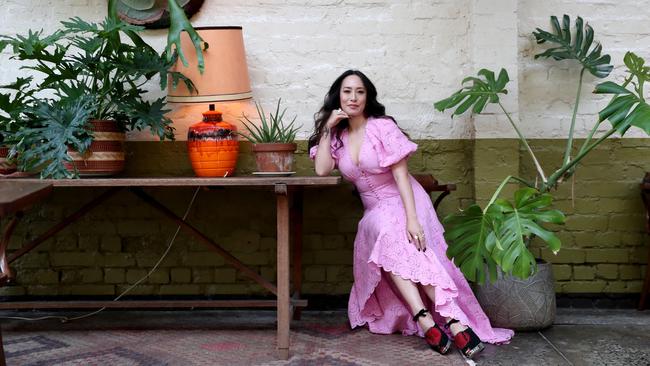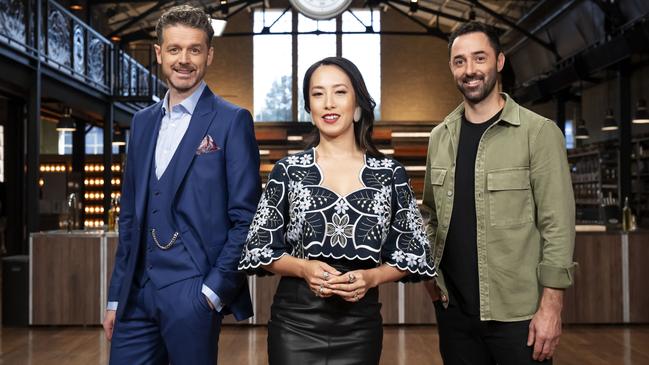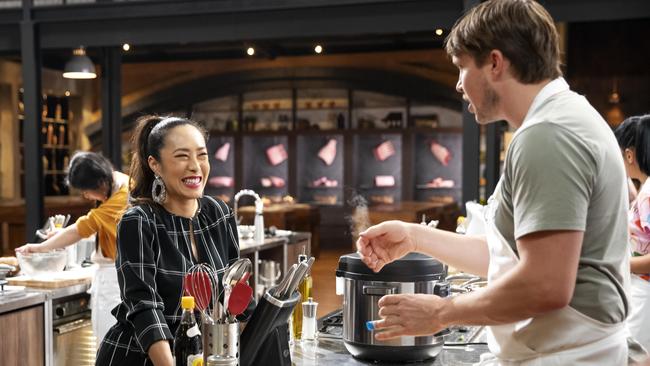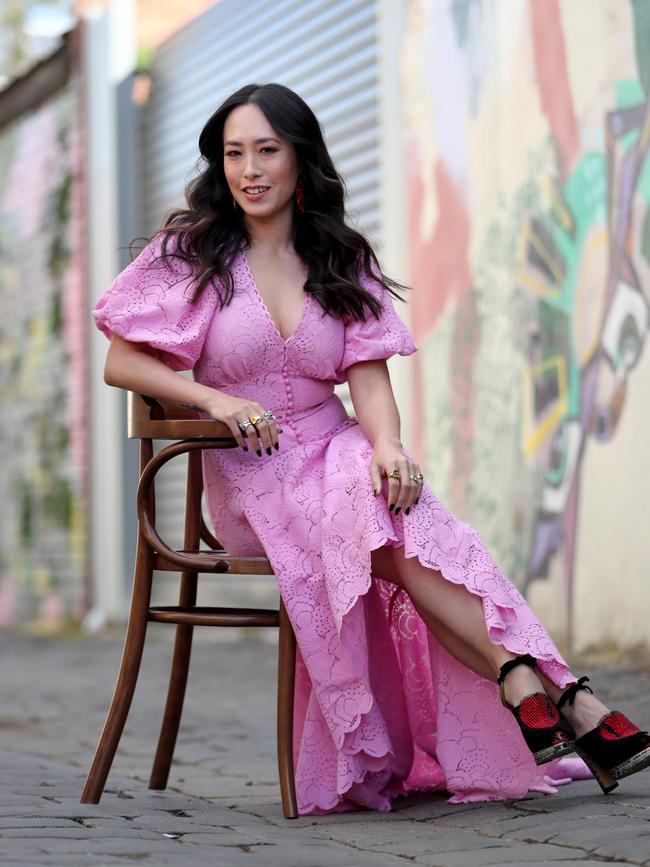Melissa Leong, MasterChef’s first female judge spurs ratings revival
Many predicted it would tank without George Calombaris, Matt Preston and Gary Mehigan. But MasterChef’s first female judge is key to the show’s astonishing revival.

Four years ago, Melissa Leong was offered an audition for a judging role on the SBS cooking show, The Chefs’ Line. “I wasn’t looking to do television at all at that stage,’’ says Leong, then a food writer and editor who had lived on a dairy farm and abattoir, but lacked TV experience.
At the audition, she waited in a green room alongside other contenders who had presented cooking shows or had plenty of on-air exposure. “I thought, ‘I’m never getting this’,’’ Leong tells Review. “I did the test and just had fun with it. I didn’t take it very seriously — I think I joked about drinking gravy.’’ The screen novice could have been forgiven for succumbing to nerves, yet “I didn’t feel overly self-conscious in that space … the more you can be yourself, the more that resonates with people”.

Leong landed The Chefs’ Line judging gig and the show, which pitted home cooks against professional chefs, launched in 2017. This year, in what she calls a “huge step up’’, she has become the first permanent female judge on one of commercial TV’s highest-rating shows, MasterChef, which screens on Network 10. Once again, the former cookbook editor — who years ago struggled with clinical depression — discovered she is “weirdly comfortable in television land’’.
Talking over the phone to Review on her day off, she says the transition from SBS to Channel 10’s ratings linchpin hasn’t been as stressful as it might have been because of the “generous” mentors she has encountered at both networks. “I’ve never felt alone in that environment,” she says. “I’ve always felt like I’ve walked onto a winning team and you’re just the new recruit.’’
When we speak, MasterChef’s 12th season is being filmed under social distancing conditions because of the COVID-19 pandemic. Planned outdoor shoots have been cancelled, contestants no longer present shared plates for the judges to sample and group hugs are off the menu, too. “They are now illegal. Who would have ever thought that would be the case?’’ Leong jokes.
Last year, the show’s producers, EndemolShine — who manage to wring improbable moments of high drama out of sauces that are runny rather than oozy, or desserts as complex as infrastructure projects — were grappling with problems far more significant than group hugs. In July, just hours before the series finale went to air, the network announced it was parting ways with its long-time judging troika Matt Preston, Gary Mehigan and George Calombaris after pay negotiations broke down.

The shock announcement followed revelations Calombaris had underpaid his restaurant staff by almost $8m. The lost wages were eventually paid, but more than 20,000 people signed a petition calling for the chef to be sacked from the network. Declining ratings, the Calombaris scandal and the abrupt departure of the judges who had presented the show since its 2009 inception underlined how the competitive cook-off had lost its bite.
This year, MasterChef producers have looked to a younger generation of relatively unknown judges — Leong, former contestant Andy Allen and celebrity chef Jock Zonfrillo — and an “all-stars” line-up of previous contestants (including former runner-up and much-loved TV chef Poh Ling Yeow) to resuscitate a flagging format. Despite predictions that ratings would tank without Preston, Mehigan and Calombaris presiding over pressure tests and teary elimination rounds, in April the revamped show achieved its highest launch ratings in five years. A network spokesman says the program’s average combined live-to-air and catch-up audience is 1,105,000 viewers, a whopping increase of 45 per cent on 2019’s figure. (This week MasterChef was outrated by the launch of Seven’s Big Brother reboot and was neck and neck in the ratings with another prime time rival, Nine’s The Voice.)

Nevertheless, the new MasterChef judges and returning contestants have pulled off one of local reality TV’s biggest comebacks. Leong, a key part of the winning formula, says: “We’ve been very surprised and very humbled by how well it’s been received in Australia. It’s a wonderful thing to feel that it has resonated with the viewers in Australia and overseas as well. It gives us a little extra bit of skip to continue to push on.’’
(In one setback, however, contestant Ben Ungermann had to leave the show after being charged by Victoria Police with sexually assaulting a 16-year-old girl. Ungermann “vehemently denies’’ the allegation.) Judging by the reception on social media, Leong, who was born in Sydney and is of Singaporean heritage, has rapidly become a fan favourite because of her empathy, impressive food knowledge and eloquence. She has called a group-devised entree “Berocca for the eyeballs’’ and a takeaway gourmet meal “an intricate waltz … among the tastebuds’’. Nor does it hurt that she is a study in beautifully put-together glamour, with her large drop earrings in bold poster colours, flawless figure and chic sense of style.
As the first woman and first Asian-Australian to present the show, she is receiving more media attention — but also more scrutiny — than the new male judges. Along with positive fan feedback, everything from how she eats, to her age (she is 38), lipstick and off-camera behaviour have been dissected in gossip mags and on Facebook and Twitter. She says some of the claims are “laughable’’ and that she doesn’t read trolls’ comments because “we’re still filming and I have my head in the game and I think that things like that distract you’’. She adds that her MasterChef role is “one of the best jobs I’ve ever had’’.
However, before the current season launched, old tweets emerged in which she was critical of the show. In 2011, she had tweeted that “the biggest mistake an amateur chef can make is going on #masterchef’’. Rather than disown or delete these embarrassing remarks, she said in a Network 10 interview that her perspectives had changed over time. “I may not believe the same things I did before, but I also don’t believe in presenting a sanitised version of myself that’s highly edited,’’ she said.
In a recent podcast, Leong revealed she had “grown up with clinical depression pretty much my entire life”. Asked about this, she says: “The reason why I think talking about mental health is important is that everybody at some stage in their lives goes through struggles, and the more we destigmatise the discussion around emotional health and mental health, the more we can help each other feel less alone.’’
She suffered a breakdown in her 20s and sought therapy because “becoming an adult is learning to become accountable for how you navigate the world with your lot in life’’. Cognitive behavioural therapy taught her not to “overload’’ her plate: “For me, a big part of anxiety and depression was not knowing how to say ‘no’ and wanting to please too many people. … part of this process is learning to draw the line and slow down.’’ She also says it’s time to stop seeing mental health problems as novel or “sensational’’. “Mental health is not a novelty; it’s part of who we are and we need to treat it as if it were a broken arm or any other kind of medical consideration,’’ she says.
I ask whether her depression was generated, in part, by the high standards she set for herself. “Oh, absolutely,’’ she replies. “If you speak to any migrant child — your parents move here from a different place in the world and they work very hard to give you the opportunities that they didn’t have — and that was certainly the case with my parents.’’ Her Singaporean parents emigrated to Sydney in the 1970s. Her mother was a nurse turned hospital administrator, and her father a draughtsman and architect. Leong “watched them work really hard — they put a lot of pressure on themselves to give us opportunities in life, and so we in turn, my brother and I, put a lot of pressure on ourselves to make sure that those sacrifices were not in vain … I can only speak to my personal experience being from a Chinese background representing a family; doing the best with what you have, excelling and achieving; it’s just part of the DNA, that’s how we are.’’
Reflecting that single-minded desire to excel, a childhood ambition to become a concert pianist was dashed by a repetitive strain shoulder injury caused by “playing several hours a day from a very young (age). It’s much like a sporting injury in that regard”. She had started playing piano at the age of four and by her mid-teens her RSI was so bad, her only options were to keep playing “and risk further pain and injury, or give up that dream’’. The curtain came down on the dream, and she ended up studying economics at the University of Sydney. After graduation, she built a career in food industry public relations and writing. She co-edited the bestselling The Great Australian Cookbook, worked on books by TV chefs Dan Hong and Colin Fassnidge, and set up her blog, Fooderati.
She says her past mental health challenges inform the encouragement and constructive criticism she gives to the MasterChef contestants. “These tremendous contestants come through the doors and they cook and (if they make a mistake) they sort of beat themselves up; that’s why I champion their successes … I know what it is like to put all of yourself in front of others and to be judged for it.’’
MasterChef has always featured an ethnically diverse roll call of contestants, and she says “that’s a really wonderful thing to have known walking in’’. As the show’s first Asian-Australian judge, she brings “a difference of perspective just through my own eyes’’. She is proud of her Singaporean heritage, and in one episode she threw contestants a curve ball by including ingredients such as black vinegar and chicken feet in a cooking challenge. (In a globalised TV market, the show’s championing of diversity has proved a shrewd move, as this has enhanced its appeal among viewers in Southeast Asia, India and South Africa, as well as Australia.)
Leong lives in Melbourne with husband Joe Jones, a former chef turned bartender who co-owns an upmarket cocktail bar in the city’s CBD. The couple eloped in 2017 and she says “we’re very well matched because all we do is talk about food all day long. Food and drink is what we do; we cook on our days off, we still enjoy it, it’s just part of how we communicate.”
She was 31 and working in food PR when she moved to an organic sheep dairy and abattoir in Tasmania for a three-month break. The idea was to have time out with friends, help on the farm and clarify her professional aspirations, as she was missing the “creativity’’ of food writing. She ended up staying in Tasmania for two years. Her dairy friends “opened their heart and home’’ to her and she gained “tangible experience of understanding where our food comes from. Agriculture is the heart and soul of Australia in so many ways. I don’t think a lot of people who live in cities quite understand the blood, sweat and tears that go into growing, rearing and producing food. Having that opportunity was one of the greatest forms of education I could have had.”
Leong remains grateful that, at a career crossroads, she was able to slow down and reorient her life. “If I hadn’t made some of those decisions, I might not be where I am now,’’ muses Australian TV’s latest breakout star.
MasterChef Australia airs at 7.30pm, Sunday to Tuesday on Ten.
READ MORE: Rita Therese: Coming too close | Teresa Palmer on witches and Game Changers


To join the conversation, please log in. Don't have an account? Register
Join the conversation, you are commenting as Logout